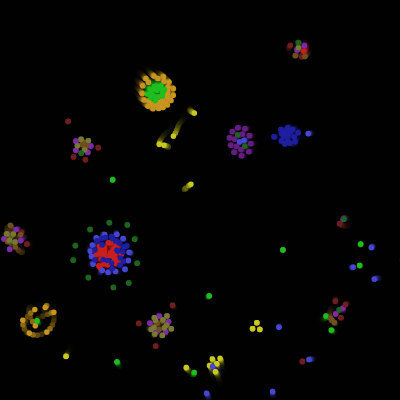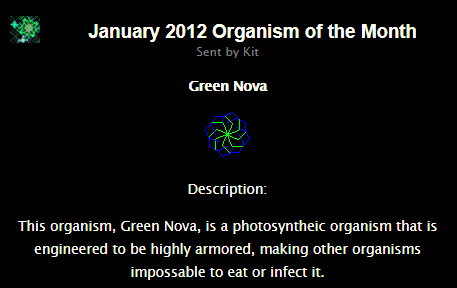artificial life review
I spent a month trying to create artificial life without knowing where the world had got to with it. Have people done it? The answer is... it's complicated. What even is life?
abiogenesis
As far as I could find, there is nothing approaching what I would call artificial life, but my definition is very strict. I'm looking for life emerging from something completely dead; no concept of an entity, no 'food points' to gain, no 'DNA' that mutates or gets copied into a new generation. I couldn't find a standard term for this; the closest thing I could find to it was artificial creation but it does not seem to be widespread and the wikipedia page is a stub. I'm going to call my long-term goal 'digital abiogenesis' for now.
Even though nobody has achieved digital abiogenesis, there have been some interesting attempts:
Clusters, also known as Particle Life, is a simulation based on particles with attraction and repulsion. It's cool seeing things that seem like 'entities' emerge from simple rules but there's a low ceiling to the complexity. I think this general approach has a lot of potential though.

Many others have been working on finding interesting things using cellular automata (CA). I have seen a lot of the things others have in my search of random rulesets; it's cool to see how universal these things are. fourierlife has a great web implementation of CA and shows off some impressive things they've found, along with talking about how simple self-replicating structures could be analogous to abiogenesis. There are many other twists you can put on CA too. I have really enjoyed looking through what everyone has made.
digital organisms
If you allow programmed-in concepts of creatures, DNA, mutations and goals then you can simulate evolution and get some nice results.
Scriptbots, Darwinbots, Biogenesis, Species and many others attempt to simulate a world of creatures evolving alongside each other.

Dave Ackley's introduction to artificial life captured me. I like the mix of philosophy and simulation. I need to watch the rest of his videos, he seems like a kindred spirit.
Primer made a series about simulating natural selection. Everything is quite simplistic compared to the other open-ended organisms, but that makes it a lot easier to understand what's going on.
Avida uses computer resources and memory as an environment. I think this is a cool concept and I might have a go at it some time!
using evolution
One common technique is to use evolution with some sort of goal in mind. You can try to optimise the design of a physical objects which ends up looking very strange.


This video about using evolution with constraints to evolve natural gaits for arbitraty bipeds is very impressive. Another example of evolutionary algorithms for locomotion.
ai and neural nets
I suspect these are very related to what I'm working on. I don't want to learn too much about them before having a try myself. They probably deserve their own article anyway :)
If you feel like I've missed some important discoveries, send me a message and I might include it in a future overview.
comments